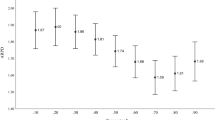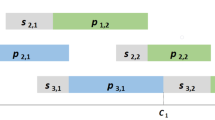Abstract
This research addresses the m-machine no-wait flowshop scheduling problem with the objective of minimizing the number of tardy jobs. The problem is known to be NP-hard even for the two machines, and literature reveals that no heuristics have been developed for this problem. In this paper, we propose an efficient heuristic based on simulated annealing, where we first adapt the single-machine optimal algorithm to our problem to develop two new heuristics, NOTA and NOTM. An improved simulated annealing heuristic, called SA-GI, is then developed by feeding the best performing heuristic among NOTA, NOTM, and EDD into the simulated annealing algorithm. A second proposed heuristic, called SA-IP, further improves the SA-GI solution by using insertion and pair-wise exchange techniques. Based on the computational experiments, the overall relative percentage errors of the heuristic SA, SA-GI, and SA-IP are 8.848, 8.428, and 0.207, respectively. The computational times of the three heuristics are close to each other, and the largest average time is less than one second, and hence, the computational time is not an issue. Therefore, the heuristic SA-IP is the best one.
Similar content being viewed by others
References
Hall NG, Sriskandarajah C (1996) A survey of machine scheduling problems with blocking and no-wait in process. Oper Res 44:510–525
Bonney MC, Gundry SW (1976) Solutions to the constrained flowshop sequencing problem. Oper Res Q 24:869–883
King JR, Spachis AS (1980) Heuristics for flowshop scheduling. Int J Prod Res 18:343–357
Gangadharan R, Rajendran C (1993) Heuristic algorithms for scheduling in the no-wait flowshop. Int J Prod Econ 32:285–290
Aldowaisan T, Allahverdi A (2003) New heuristics for no-wait flowshops to minimize makespan. Comput Oper Res 30:1219–1231
Framinan JM, Nagano MS (2008) Evaluating the performance for makespan minimization in no-wait flowshop sequencing. J Mater Process Technol 197:1–9
Pan QK, Tasgetiren MF, Liang YC (2008) A discrete particle swarm optimization algorithm for the no-wait flowshop scheduling problem. Comput Oper Res 35:2807–2839
Singh OP, Chand S (2009) Supply chain design in the electronics industry incorporating JIT purchasing. Eur J Ind Eng 3:21–44
Warburton RDH (2009) EOQ extensions exploiting the Lambert W function. Eur J Ind Eng 3:45–69
Sharma S (2009) On price increases and temporary price reductions with partial backordering. Eur J Ind Eng 3:70–89
Adiri I, Pohoryles D (1982) Flowshop/no-idle or no-wait scheduling to minimize the sum of completion times. Nav Res Logist Q 29:495–504
Rajendran C, Chaudhuri D (1990) Heuristic algorithms for continuous flow-shop problem. Nav Res Logist 37:695–705
van der Veen JAA, van Dal R (1991) Solvable cases of the no-wait flowshop scheduling problem. J Oper Res Soc 42:971–980
Chen CL, Neppalli RV, Aljaber N (1996) Genetic algorithms applied to the continuous flow shop problem. Comput Ind Eng 30:919–929
Aldowaisan T, Allahverdi A (2004) A new heuristic for m-machine no-wait flowshop to minimize total completion time. OMEGA Int J Manag Sci 32:345–352
Chang JL, Gong DW, Ma XP (2007) A heuristic genetic algorithm for no-wait flowshop scheduling problem. J China Univ Min Tech 17:582–586
Allahverdi A, Aldowaisan T (2004) No-wait flowshops with bicriteria of makespan and maximum lateness. Eur J Oper Res 152:132–147
Pinedo M (1995) Scheduling; theory, algorithms, and systems. Prentice Hall, Englewood Cliffs
Lenstra JK, Kan AHG, Brucker P (1977) Complexity of machine scheduling problems. Ann Discrete Math 1:343–362
Koulamas C (1998) On the complexity of two-machine flowshop problems with due date related objectives. Eur J Oper Res 106:95–100
Crocea FD, Gupta JND, Tadei R (2000) Minimizing tardy jobs in a flowshop with common due date. Eur J Oper Res 120:375–381
M’Hallah R, Bulfin RL (2003) Minimizing the weighted number of tardy jobs on a two-machine flow shop. Eur J Oper Res 30:1887–1900
Hariri AMA, Potts CN (1989) A branch and bound algorithm to minimize the number of late jobs in a permutation flowshop. Eur J Oper Res 38:228–237
Choi H-S, Lee D-H (2009) Scheduling algorithms to minimize the number of tardy jobs in two-stage hybrid flow shops. Comput Ind Eng 56:113–120
Lee W-C, Chen S-K, Wu C-C (2010) Branch-and-bound and simulated annealing algorithms for a two-agent scheduling problem. Expert Syst Appl 37(9):6594–6601
Naderi B, Tavakkoli-Moghaddam R, Khalili M (2010) Electromagnetism-like mechanism and simulated annealing algorithms for flowshop scheduling problems minimizing the total weighted tardiness and makespan. Knowl-Based Syst 23:77–85
Ulusam Seçkiner S, Kurt M (2007) A simulated annealing approach to the solution of job rotation scheduling problems. Appl Math Comput 188:31–45
Zhang R, Wu C (2010) A hybrid immune simulated annealing algorithm for the job shop scheduling problem. Appl Soft Comput 10:79–89
Nawaz M, Enscore E, Ham I (1983) A heuristic algorithm for the m-machine, n-job flowshop sequencing problem. OMEGA The International Journal of Management Sciences 11:91–95
Kim YD (1995) Minimizing total tardiness in permutation flowshops. Eur J Oper Res 85:541–555
Dath TNS, Rajendran C, Narashiman K (2010) An empirical study on supply chain management in India: the perspective of original equipment manufacturers and suppliers. Eur J Ind Eng 4:2–39
Bahroun Z, Moalla M, Baazaoui G, Campagne JP (2010) Multi-agent modelling for replenishment policies simulation in supply chains. Eur J Ind Eng 4:450–470
Lehoux N, D'Amours S, Langevin A (2010) A win-win collaboration approach for a two-echelon supply chain: a case study in the pulp and paper industry. Eur J Ind Eng 4:493–514
Valente JMS, Schaller JE (2010) Improved heuristics for the single machine scheduling problem with linear early and quadratic tardy penalties. Eur J Ind Eng 4:99–129
Soroush HM (2010) Single-machine scheduling with inserted idle time to minimize a weighted quadratic function of job lateness. Eur J Ind Eng 4:131–166
Manaa A, Chu C (2010) Scheduling multiprocessor tasks to minimize the makespan on two dedicated processors. Eur J Ind Eng 4:265–279
Besbes W, Teghem J, Loukil T (2010) Scheduling hybrid flow shop problem with non-fixed availability constraints. Eur J Ind Eng 4:413–433
Acknowledgments
This research is supported by Kuwait University Research Administration project number EI02/09. The authors are indebted to the anonymous referees for their valuable comments on revised versions of this paper. Their comments significantly improved the presentation and clarification of the paper.
Author information
Authors and Affiliations
Corresponding author
Appendix—SA-GI pseudo code
Appendix—SA-GI pseudo code

Rights and permissions
About this article
Cite this article
Aldowaisan, T.A., Allahverdi, A. No-wait flowshop scheduling problem to minimize the number of tardy jobs. Int J Adv Manuf Technol 61, 311–323 (2012). https://doi.org/10.1007/s00170-011-3659-x
Received:
Accepted:
Published:
Issue Date:
DOI: https://doi.org/10.1007/s00170-011-3659-x




